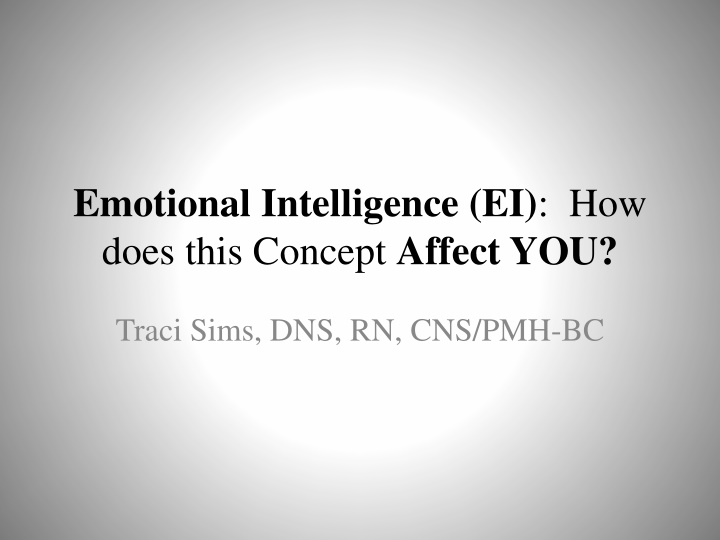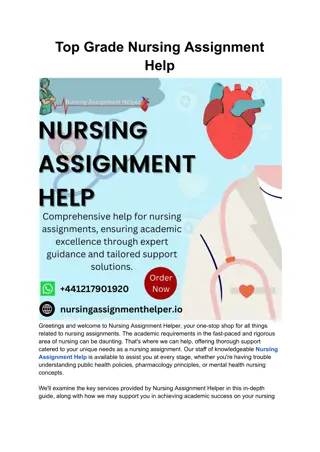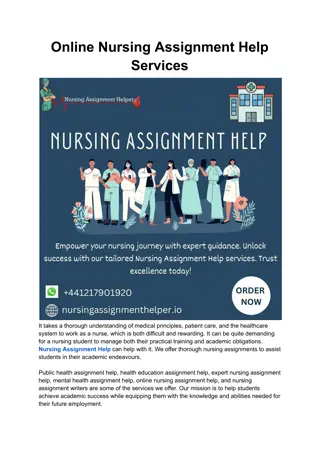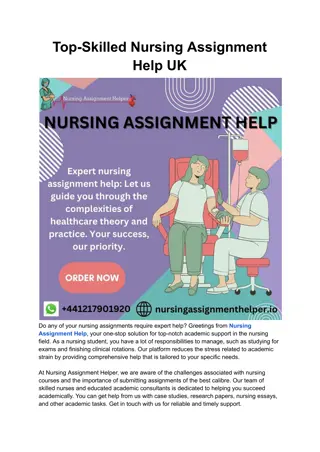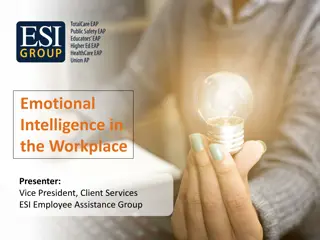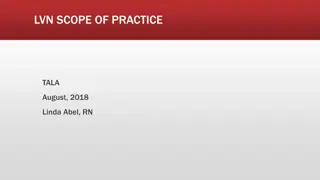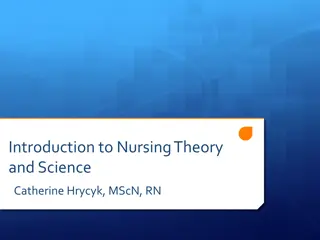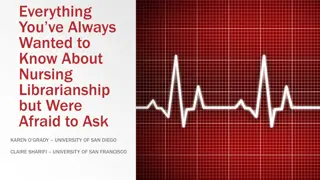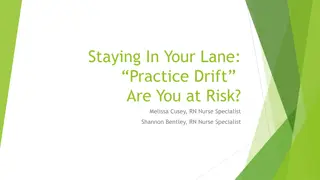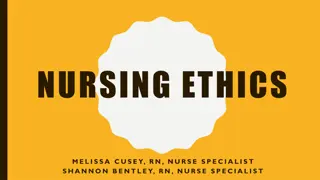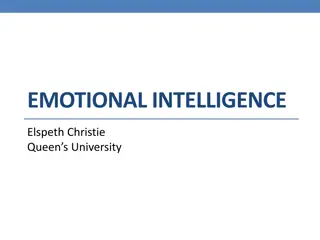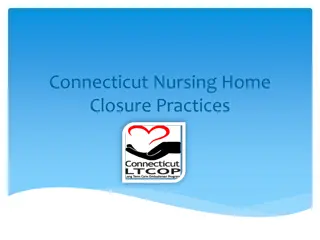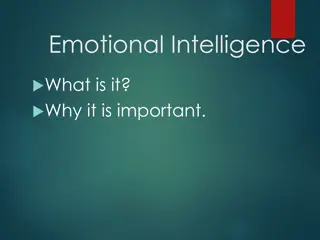The Impact of Emotional Intelligence in Nursing Practice
Emotional intelligence plays a crucial role in nursing, influencing personal well-being, patient outcomes, and stress management. Nurses with higher emotional skills are better equipped to navigate the challenges of their profession. Understanding the history and significance of emotional intelligence enhances the effectiveness of nursing care.
Download Presentation

Please find below an Image/Link to download the presentation.
The content on the website is provided AS IS for your information and personal use only. It may not be sold, licensed, or shared on other websites without obtaining consent from the author.If you encounter any issues during the download, it is possible that the publisher has removed the file from their server.
You are allowed to download the files provided on this website for personal or commercial use, subject to the condition that they are used lawfully. All files are the property of their respective owners.
The content on the website is provided AS IS for your information and personal use only. It may not be sold, licensed, or shared on other websites without obtaining consent from the author.
E N D
Presentation Transcript
Emotional Intelligence (EI): How does this Concept Affect YOU? Traci Sims, DNS, RN, CNS/PMH-BC
Objectives 1. Understand definition and history of emotional intelligence (EI) 2. Understand a model of EI 3. Consider the concept of EI in your nursing career 4. Take the STEM-B
Emotional intelligence may be the best predictor of success in life, redefining what it means to be smart. (Gibbs, 1995, Front Cover of Time s Magazine) \
A lack of emotional skills in nurses may affect their personal well-being and has the potential to negatively affect patient outcomes (Codier, Muneno, & Frieitas, 2011; McQueen, 2004).
Success in work and life depends on both cognitive abilities and personal qualities that involve perception, understanding, and regulation of emotion (Cherniss, 2010)
EI has been identified as an important construct for nursing practice and as important as practical important as practical expertise expertise as (Codier, 2010; Wright, 2009)
In a study with students in helping disciplines, greater EI was associated with lower perceptions of stress. Higher EI was associated with greater use of adaptive coping skills and lower use of maladaptive coping. (Enns, Eldridge, Montgomery, & Gonzalez, 2018)
Background of EI 1960 s concept first used in the literature 1997 defined by Mayer and Salovey as an ability to perceive, use, understand and manage emotions; developed an ability of model of EI (Test MSCEIT) 1995 - Daniel Goldman published his book (Mixed Model) 2006 - Other EI theories and tools to measure EI developed (e.g. SREIS) 2018 EI studies continue
Bellack (1999) called for nurse educators to teach nursing students EI skills because she believed nursing students were graduating and lacking emotional and social competencies in order to be successful to adapt to the world of work. Bellack (2018) editor of Journal of Nursing Education, stated EI competencies are necessary ingredients for effective, high- quality performance in such a relationship- intense profession as nursing (p. 455)
Mayer-Salovey-Caruso Four-Branch Ability Model of EI EI defined: - Ability to perceive emotions - Ability to use emotions - Ability to understand emotions - Ability to manage emotions Mayer, J. D., & Salovey, P. (1997). What is emotional intelligence? In P. Salovey & D. J. Sluyter (Eds.). Emotional development and emotional intelligence. New York: Basic Books.
Measurement Instruments of EI Mayor-Salovey-Caruso Emotional Intelligence Test (MSCEIT) Self-Report Emotional Intelligence Scale (SREIS) Situational Test of Emotional Understanding (STEU) Situational Test of Emotional Management (STEM) (Allen et al., 2015)
2017 Nursing Student EI Study Nursing students are bombarded with multiple stressors that complicate their nursing school experience. Understanding the concept of EI and implementing EI strategies in school could help prepare these future nurses to learn more effective communication skills. The purpose of this mixed method design was to increase nursing students knowledge about EI through an online module and compare pre- and post- EI test scores.
2017 Nursing Student EI Study What have you learned about EI: I should express my feelings instead of keeping issues inside as it tends to build up; EI involves managing my actions, and my reactions to others actions; It is not always easy and straight forward. It takes thought and practice; EI takes work to be truly honest with yourself and acknowledge whatever emotion you have; there are many useful coping strategies for managing your own emotions and for coping with those of others
2017 Nursing Student EI Study What EI strategies do you currently use or plan to use: Deep breathing, talk to close ones, and spending time with myself to reflect; To become more aware of my emotions by talking to someone & taking care of myself; Listening fully, being present ; Be patient with myself to allow time to think about how I m feeling and how to respond; Taking a minute to pause and breathe
Threading EI Through a Nursing Curriculum Choose an EI Theory/Instrument Systematically and intentionally thread EI skills throughout curriculum (e.g. reflection, journaling, pause, how to release emotions) teaching faculty EI skills Measure students EI level Give feedback Practice EI skills throughout curriculum
STEM - B Take the STEM-B See results Consider your own strengths and challenges
Emotional Intelligence: How does EI Affect Us and our Nursing Profession?
Objectives 1. Assess your mental status 2. Accurately (ask others?) evaluate your EI skills 3. BE proactive - consider changes to decrease your stress this year
BE NiceBE Aware Bellack (2018) concerns of bullying and incivility for nursing graduates When we look at our NCLEX results, are faculty evaluating your ability to Be nice and be aware ? Does your faculty reflect qualities associated with EI?
EI Abilities Do you consistently pay attention to the emotions you are feeling? What do you do with negative emotions? Do you have the ability to pick-up on other people s emotions? How do you handle other people s negative emotions? What skills do you have to handle conflict? Do you have a support team to encourage you?
What are YOU doing Currently to lower your Stress? ?
Consider If you have negative emotions that affect your quality of life, consider seeking counseling (e.g. history of trauma, physical symptoms difficulty sleeping, anxiety, depression) Stress reduction practices: sleep, exercise, nutrition (including lowering caffeine and other substances), healthy support team, and consistently practicing releasing negative emotions
WHAT CAN YOU CHANGE to Experience Consistently Healthy Emotional Living? ?
